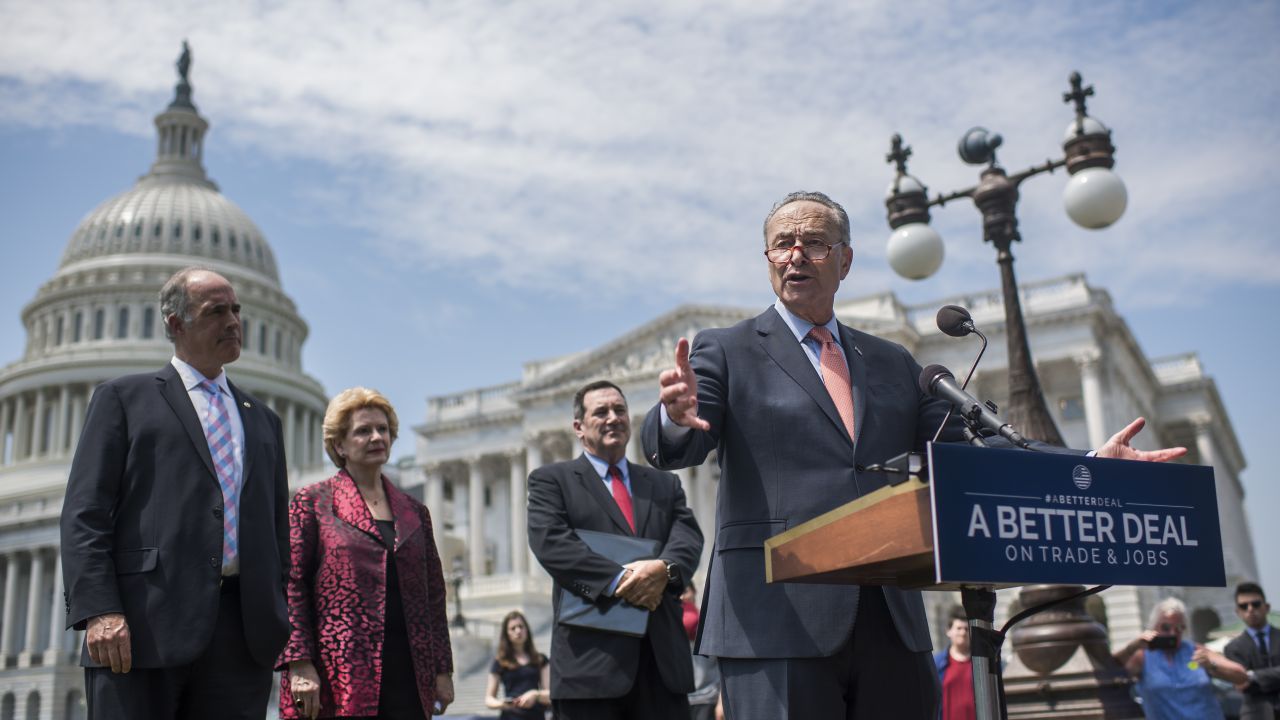
Senate Minority Leader Charles Schumer (D-NY) holds a news conference on the east lawn of the Capitol to unveil the Democrats' "A Better Deal on Trade and Jobs" economic agenda on Aug. 2, 2017. He was joined by (left to right) Sens. Bob Casey (D-PA), Debbie Stabenow (D-MI) and Joe Donnelly (D-IN). (Photo By Tom Williams/CQ Roll Call)
This post originally appeared at The Nation.
The Democrats continue to roll out their agenda, and I’m noticing a pattern. Want to lower the cost of prescription drugs? They’ve got a “price gouging” enforcer, the director of a new agency dedicated to investigating drug manufacturers that jack up the cost on their products. How about breaking concentrated corporate power across all fields? They’ve got a consumer-competition advocate who would recommend investigation of monopolistic industries to the Justice Department and the Federal Trade Commission. How about trade, a policy ripped away from liberals by Donald Trump? Democrats have you covered there too, with a new “American Jobs Security Council” that can veto foreign purchases of stateside companies on economic grounds, and an independent trade prosecutor that would challenge unfair trade practices outside of the World Trade Organization framework.
Now, these aren’t the only proposals in the Better Deal. But they stand out, particularly because the new suggested positions duplicate existing structures within the federal government. The FTC (and, to a lesser extent, the Food and Drug Administration) is supposed to monitor drug prices, as well as other monopolies. The Committee on Foreign Investment in the United States (CFIUS) votes on foreign mergers. And the US trade representative handles trade disputes.
Of course, building new agencies with targeted missions was a hallmark of the New Deal. And like under FDR, these Better Deal agencies are an admission that the current framework is fatally corrupted, unresponsive to public needs. The FTC has stood relatively mute amid massive consolidation in virtually every industry. There hasn’t been a major case to break up a monopoly since the Microsoft suit in the late 1990s. Drug-price spikes are also occurring without much resistance, at least not from policymakers. CFIUS is a coalition of Cabinet members that only screens foreign investment for national-security implications; though the secretaries of Commerce and Labor sit on the committee and the White House’s chief economists participate, there’s no economic screen.
What’s really going on is that Democrats are trying to recapture the magic of the Consumer Financial Protection Bureau, the popular brainchild of Elizabeth Warren. That, too, was an agency that took over mostly existing capabilities; the FTC and the Federal Reserve had consumer-protection responsibility in financial dealings. But they were indifferent to the job because it wasn’t their sole mission. CFPB reordered these priorities under one roof with a singular mission—protect consumers. And it’s worked.
In fact, CFPB was really the only major new agency of the Obama era. And its history serves as an example that the culture of an agency matters in its effectiveness. Early stories about CFPB always highlighted this — how the examiners often came from outside agencies and the feel was more akin to a startup. Eventually the revolving door came spinning there as well, but for the most part the agency has maintained its mission.
The question is whether this is endlessly replicable, and whether it’s good practice to pile on new agencies on top of the old. And there’s another problem here: Changing the structure of the federal government is the kind of policy rollout best associated with a presidential campaign, not a midterm election. Even if Democrats were able to get these new agencies authorized, Donald Trump would be filling the seats until at least 2021. Democrats are asking for the reins of power, but making promises that at least in part would be restrained by the limits of that power in the near term.
Some might see cynicism in this approach. Democrats call for support in 2018 with an agenda that would require support in 2020. With the fragmented nature of our system, that’s somewhat inevitable, but it sure makes it easier to live up to your midterm campaign promises when they can’t be lived up to.
It’s worth noting that several Better Deal policies break with that trend. Democrats want Medicare to be able to negotiate drug prices (something they’ve promised before, then gave up on during the Affordable Care Act debate). They have a $1 trillion infrastructure bill and a plan to raise the minimum wage to $15 per hour by 2024. The competition policy proposal would change federal merger guidelines to reflect the broad range of harms caused by monopolies. On trade, Democrats want to penalize federal contractors who outsource jobs, add Buy America provisions to every project funded by taxpayers and punish currency manipulation.
But as much as it’s a cop-out in the short term, the call for new Better Deal agencies recognizes a problem. New laws have to be carried out by an old bureaucracy. And the current one doesn’t work for the people anymore. It serves special interests, and its top officers think more about career advancement than the public good. On trade and competition and drug prices, regardless of which party has done the appointing lately, the public has gotten shafted. Is that a result of who was doing the picking, or agency culture that is rigid to change?
Admitting we need to start over reflects a reformist tendency that gave us the alphabet-soup agencies after the Depression. It’s an indictment of the predecessors, even on the Democratic side, who were unable and unwilling to alter the system. And it’s a warning shot to the expected bevy of 2020 candidates that they cannot think small about the task at hand: that they must reengineer instead of tinker.
The Better Deal isn’t entirely about building a new government atop the old one. But that tendency stands out, and, while it’s something of a dodge, it’s also as quietly radical as anything we’ve seen recently from a major political party.




